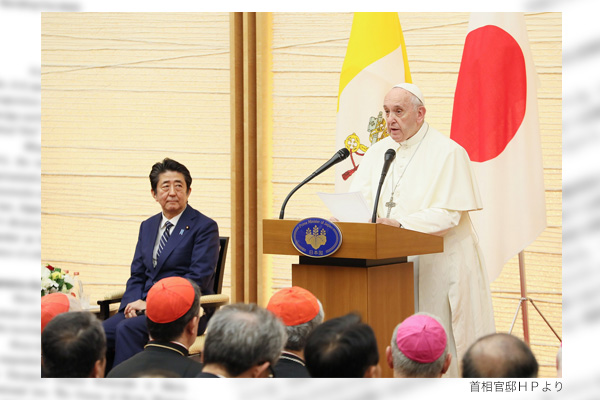On November 23, Pope Francis aboard an aircraft on his way to Japan sent messages to the leaders of China, Taiwan and Hong Kong. He made no mention of protesters in Hong Kong, although some Christians there were collecting signatures seeking the pope’s intervention toward a humanitarian settlement of Hong Kong protest demonstrations. Despite the fact that Vatican is the only European state having diplomatic relations with Taiwan, his message to Taiwan was limited to a courtesy statement.
On November 26 shortly after pro-democracy candidates won a landslide victory in district council elections in Hong Kong, the pope refrained from directly answering a question about Hong Kong protests during a press conference on board the flight back to Rome from Japan, saying that problems were occurring around the globe. Instead, he said, “I would like to go to Beijing. I love China.”
Pope Francis might have responded realistically to prevent relations with China from worsening after an interim agreement with China over the appointment of bishops in September 2018. If he is realistic, however, he should not have made unrealistic claims that nuclear deterrence is illegal and that nuclear power plant should not be used.
Vatican’s compromise with CCP
China has thoroughly repressed Christianity since the founding of the nation. Beijing controls Catholic churches through the government-affiliated Chinese Patriotic Catholic Association. In addition to these authorized churches, there are underground churches backing the pope. China has some 100 bishops including 65 for authorized churches and 36 for underground churches. Since the interim agreement last year, Vatican has recognized all of the authorized bishops.
The Xi Jinping government has refrained from appointing bishops likely to be rejected by Vatican. While willing to put underground churches under control, the government has kept from doing so in the face of strong resistance. Although President Xi advocated the “Chinization” of religions in a report to the 2017 Communist Party Congress and seems to be enhancing crackdown on religions, the Communist Party has effectively maintained a tacit coexistence with Catholic churches.
Acknowledging the fact, the pope has taken a political attitude of refraining from strangling China. Once an admirer of Cuban leader Fidel Castro, the pope has been called a Marxist-Bishop in Argentina where he is from.
Why not advocate a nuclear-free world in Beijing?
Japan depends on U.S. nuclear deterrence because neighboring North Korea, China and Russia are armed with nuclear weapons and enhancing missiles for their delivery qualitatively and quantitatively. Despite the fact, the pope, while in Japan with no nuclear arms, said that nuclear weapons could not protect any country and that nuclear deterrence was also illegal. I wonder why he even said he loved China that is building up nuclear arsenals. If the pope wants to go to Beijing, he should advocate the elimination of nuclear weapons there.
Fumio Ota is a senior fellow and a Planning Committee member at the Japan Institute for National Fundamentals. He is a retired Vice Admiral of Japan’s Maritime Self-Defense Force.


